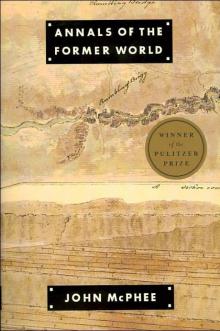Read Annals of the Former World Storyline:
Twenty years ago, when John McPhee began his journeys back and forth across the United States, he planned to describe a cross-section of North America at about the fortieth parallel and, in the process, come to an understanding not only of the science but of the style of the geologists he traveled with. The structural arrangement of the work never changed, but its breadth caused him to complete it in stages, under the overall title Annals of the Former World.In Basin and Range, McPhee traverses the Basin and Range province, from Utah to eastern California, accompanied by Kenneth S. Deffeyes, a professor of geology who has done extensive field work in Nevada. In Suspect Terrain follows McPhee from the outwash plains of Brooklyn to Indiana's drifted diamonds and gold, in the company of the United States Geological Survey's Anita Harris, a Brooklyn native. In Rising from the Plains, he rides across Wyoming with David Love, a field geologist with a family history on the frontier and an unsurpassed understanding of Western geology. Assembling California takes McPhee across the Sierra Nevada and the Great Central Valley to the wine country of the Coast Ranges, the rock of San Francisco, and the San Andreas family of faults, with tectonicist Eldridge Moores as guide. In Crossing the Craton, a new and final essay and the last link in the cross-country chain, he and Randy Van Schmus, a geochronologist, explore the midcontinent's Precambrian basement.Like the terrain it covers, Annals of the Former World tells a many-layered tale, and the reader may choose one of many paths through it, guided by twenty-five new maps and the "Narrative Table of Contents" (an essay outlining the history and structure of the project). Read sequentially, the book is an organic succession of set pieces, flashbacks, biographical sketches, and histories of the human and lithic kind; approached systematically, it can be a North American geology primer, an exploration of plate tectonics, or a study of geologic time and the development of the time scale. As clearly and succinctly written as it is profoundly informed, this is our finest popular survey of geology, and a masterpiece of modern nonfiction writing.John McPhee was born in Princeton, New Jersey, and was educated at Princeton University and Cambridge University. His writing career began at Time magazine and led to his long association with the New Yorker, where he has been a staff writer since 1965. The same year he published his first book, A Sense of Where You Are, with FSG, and soon followed with The Headmaster (I 966), Oranges (1967), The Pine Barrens (1968), A Roomful of Hovings and Other Profiles (collection, 1969), The Crofter and the Laird (1969), Levels of the Game (1970), Encounters with the Archdruid (1972), The Deltoid Pumpkin Seed (1973), The Curve of Binding Energy (1974), Pieces of the Frame (collection, 1975), and The Survival of the Bark Canoe (1975). Both Encounters with the Archdruid and The Curve of Binding Energy were nominated for National Book Awards in the category of science.Since 1977, the year in which McPhee received the Award in Literature from the American Academy of Arts and Letters and The John McPhee Reader and the bestselling Coming into the Country appeared in print, Farrar, Straus and Giroux has published Giving Good Weight (collection, 1979), Basin and Range (1981), In Suspect Terrain (1983), La Place de la Concorde Suisse (1984), Table of Contents (collection, 1985), Rising from the Plains (1986), Heirs of General Practice (in a paperback edition, 1986), The Control of Nature (1989), Looking for a Ship (1990), Assembling California (1993), The Ransom of Russian Art (1994), The Second John McPhee Reader (1996), and Irons in the Fire (1997). Annals of the Former World was published in 1998 and was awarded the Pulitzer Prize in 1999."[McPhee] triumphs by succinct prose, by his uncanny ability to capture the essence of a complex issue, or an arcane trade secret, in a well-turned phrase." (Stephen Jay Gould, The New York Review of Books )"The finest non-technical overview of geology ever written. . .McPhee excels at crisp imagery and vivid, ace-scientist personalities to five a pulse to a body of data and strata." (Milo Miles, The Boston Sunday Globe)"No other work explains so well -- and so vividly -- to the layman the living principles of geology. . . More than anyone else, McPhee has turned the world on to rocks." (Henry Kisor, Chicago Sun Times)"Sunlit, brilliant. . . this book of wonders. . . ranks with the JOURNALS OF LEWIS AND CLARK." (John Skow, Time Magazine)Walt Whitman declared, "The United States are essentially the greatest poem." As if in response, John McPhee has produced, over nearly a quarter of a century, a deep philology of the continent. Annals of the Former World is surely a classic. If I didn't know better, I'd say it was timeless (Village Voice)"This major book incorporates some of the author's best work on geology into a comprehensive tour de force. Those familiar with McPhee's writing on the subject of geology will know that his narrative includes not only scientific theory but also portraitures of his geologic guides ... McPhee's many fans won't be disappointed with the high-quality descriptive portraits of geologists, their work and theories. Since the writing follows McPhee's previous works and not any set geography or geologic logic, the author has provided what he calls a 'Narrative Table of Contents,' which not only describes each section in turn but the theories discussed in it. In this near flawless compilation of ambitious and expansive scope, McPhee's personalized style remains consistent and triumphant." (Publishers Weekly [starred review])"No one else can take topics as diverse and seemingly dry and make of them such diverting, entertaining, and educational literature ... This is the book on geology. (Library Journal [starred review])Pages of Annals of the Former World :
